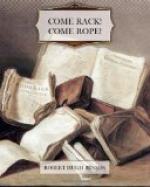Yet the difference was profound. Certainly there was no talk, overheard at least by the servants, which might not have been on any Sunday for the last twenty years: the congratulations and good wishes, or whatever they were, must have been spoken between the three in the parlour before dinner; and they spoke now of harmless usual things—news of the countryside and tales from Derby; gossip of affairs of State; of her Grace, who, in a manner unthinkable, even by now dominated the imagination of England. None of these three had ever seen her; the squire had been to London but once in his life, his two guests never. Yet they talked of her, of her state-craft, of her romanticism; they told little tales, one to the other, as if she lived in the county town. All this, then, was harmless enough. Religion was not mentioned in the hearing of the servants, neither the old nor the new; they talked, all three of them, and the squire loudest of all, though with pauses of pregnant silence, of such things as children might have heard without dismay.
Yet to the servants who came and went, it was as if their master were another man altogether, and his hall some unknown place. There was no blessing of himself before meat; he said something, indeed, before he sat down, but it was unintelligible, and he made no movement with his hand. But it was deeper than this ... and his men who had served him for ten or fifteen years looked on him as upon a stranger or a changeling.
CHAPTER VII
I
The same Easter Day at Padley was another matter altogether.
As early as five o’clock in the morning the house was astir: lights glimmered in upper rooms; footsteps passed along corridors and across the court; parties began to arrive. All was done without ostentation, yet without concealment, for Padley was a solitary place, and had no fear, at this time, of a sudden descent of the authorities. For form’s sake—scarcely for more—a man kept watch over the valley road, and signalled by the flashing of a lamp twice every party with which he was acquainted, and there were no others than these to signal. A second man waited by the gate into the court to admit them. They rode and walked in from all round—great gentlemen, such as the North Lees family, came with a small retinue; a few came alone; yeomen and farm servants, with their women-folk, from the Hathersage valley, came for the most part on foot. Altogether perhaps a hundred and twenty persons were within Padley Manor—and the gate secured—by six o’clock.
Meanwhile, within, the priest had been busy since half-past four with the hearing of confessions. He sat in the chapel beside the undecked altar, and they came to him one by one. The household and a few of the nearer neighbours had done their duty in this matter the day before, and a good number had already made their Easter duties earlier in Lent; so by six o’clock all was finished.




